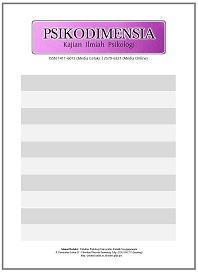BURNOUT DITINJAU DARI EMPLOYEE ENGAGEMENT PADA KARYAWAN
Abstract
engagement dengan burnout. Hipotesis yang diajukan dalam penelitian ini
adalah terdapat hubungan negatif antara employee engagement dengan
burnout pada karyawan PT BPR Restu Group. Metode yang digunakan
dalam penelitian ini adalah dengan cara penelitian kuantitatif dan dengan
menggunakan skala burnout dan employee engagement. Penelitian ini
menggunakan teknik analisis korelasi product moment. Hasil nilai rxy= -
0,671 (p<0,05), hal ini menunjukkan bahwa adanya hubungan negatif yang
sangat signifikan antara employee engagement dengan burnout. Subyek
penelitian ini berjumlah 34 karyawan yang bekerja di PT BPR Restu Group
dengan masa kerja minimal 3 tahun dan dengan jabatan account officer.
Dalam hal ini dapat disimpulkan bahwa hipotesis yang diajukan peneliti
diterima.
Keywords
Full Text:
PDFReferences
Admasachew, L., & Dawson, J. 2011. The Association Between Presenteeism and Engagement of National Health Service Staff. Journal of Health Service Research & Policy. Vol. 16 (29-33).
Albrecht, S. L. 2010. Handbook of Employee Engagement Perspectives, Issues, Research and Practice. Melbourne : Monash University.
Azwar, S. 2013. Metode Penelitian. Yogyakarta : Pustaka Pelajar.
Balducci, C., Fraccaroli, F., Schaufeli, W. B. 2010. Psychometric Properties of the Italian Version of the Utrecht Work Engagement Scale (UWES-9). European Journal of Psychological Assessment. Vol. 26 (2) : 143-149.
Bria, M., Spanu, F., Baban, A., Dumitrascu, D. L. 2014. Maslach Burnout Inventory-General Survey : Factorial validity and invariance among Romanian healthcare professionals. Journal Burnout Research. Vol. 1 (103-111).
Cherniss, C. 1987. Staff Burnout- Job Stresss in the Human Services. Beverly Hilss London : Sage Studies in Community Mental Health 2. (Fifth printing)
De Cenzo, D. A., & Robbins, S. P. 1996. Human Resource Management. New Baskerville : John Wiley & Sons, Inc. (Fifth edition)
Diaz, R. 2007. Hubungan antara burnout dengan motivasi berprestasi akademis pada mahasiswa yang bekerja. Skripsi. Depok : Universitas Gunadarma.
Fathoni, H.A. 2006. Organisasi dan Manajemen Sumber Daya Manusia. Jakarta : Rineka Cipta
Gonzalez-Roma, V., Schaufeli, W. B., Bakker, A. B., Lloret, S. 2006. Burnout and Work Engagement : Independent Factors or Opposite Poles ?. Journal of Vocational Behavior. Vol. 68 (165-174).
Hakanen, J. J., & Koivumaki, J. 2014. Engaged or Exhausted- How Does It Affect Dentist's Clinical Productivity. Journal Burnout Research. Vol. 1 (12-18).
Halbesleben, J. R. B., Harvey, J., Bolino, M. C. 2009. Too Engaged ? a Conservation of Resources View of the Relationship Between Work Engagement and Work Interfence with Family. Journal of Applied Psychology. Vol. 94 : 6 ( 1452-1465).
Kahn, W. A. 1990. Psychological Conditions of Personal Engagement and Disengagement at Work. Academy of Management Journal. Vol. 33 (4, 692- 724).
Kreitner, R., & Kinicki, A. 2005. Perilaku Organisasi Edisi 5 Buku 2 Indonesia. Alih Bahasa : Erly Suandy. Jakarta : Penerbit Salemba Empat.
Kruse, K. 2012. “Employee engagement”. Available at http://www.forbes.com/site s/kevinkruse/2012/06/22/e mployee-engagementwhat- and-why/ diakses 18 Februari 2016.
Leon, M. R., Halbesleben, J. R. B., Paustian-Underdahl, S. C. 2015. A Dialectical Perspective on Burnout and Engagement. Journal Burnout Research. Vol. 2 (87-96).
Little, B., & Little, P. 2006. Employee engagement : Conceptual issues. Journal of Organizational Culture, Communication and Conflict. Vol. 10 (1) : 111- 113.
Llorens-Gumbau S., & Salanova- Soria M. 2014. Loss and Gain Cycles ? A Longitudinal Study about Burnout, Engagement, and Self-Efficacy. Journal Burnout Research. Vol. 1 (3-11).
Murnianita, F. B. 2012. Pengaruh Kepemimpinan Terhadap Employee Engagement Pada PT PLN (Persero) PUSDIKLAT. Thesis . Jakarta : Universitas Indonesia. Nink, M. 2015. The German Workforce Has a Burnout Problem. Gallup.
Puspitasari, D. A. & Handayani, M. M. 2014. Hubungan Tingkat Self-Efficacy Guru dengan Tingkat Burnout pada Guru Sekolah Inklusif di Surabaya. Jurnal Psikologi Pendidikan dan Perkembangan. Vol. 3, No. 1 (59-68)
Rahmati, Z. 2015. The Study of Academic Burnout in Students with High and Low Level of Self-Efficacy. Procedia- Social and Behavioral Sciences. Vol. 171 (49-55).
Rahmawati, Y. 2013. Hubungan antara stres kerja dengan burnout pada karyawan bagian operator PT. Bukit Makmur Mandiri Utama. Skripsi. Surakarta : Universitas Muhammadiyah Surakarta.
Schaufeli, W. B., Leiter, M. P., Maslach, C. 2009. Burnout : 35 Years of Research and Practice. Journal Career Development International. Vol. 14, No.3. (204-216).
Sihotang, I. N. 2004. Burnout Pada Karyawan Ditinjau Dari Persepsi Terhadap Lingkungan Kerja Psikologis Dan Jenis Kelamin. Jurnal Psyche. Vol. 1, hal. 10-17.
Tawale, E. N., Budi, W., Nurcholis, G. 2011. Hubungan antara Motivasi Kerja Perawat dengan Kecenderungan Mengalami Burnout pada Perawat di RSUD Serui-Papua. Jurnal INSAN. Vol. 13. No. 02 (74-84)
DOI: https://doi.org/10.24167/psiko.v15i2.996
Print ISSN : 1411-6073 | online ISSN : 2579-6321 View My Stats

This work is licensed under a Creative Commons Attribution 4.0 International License.




















